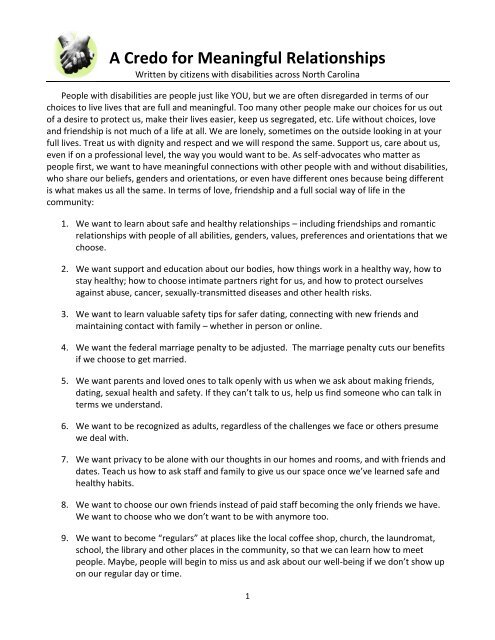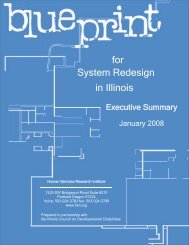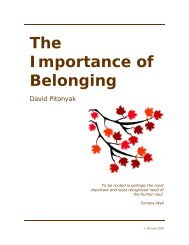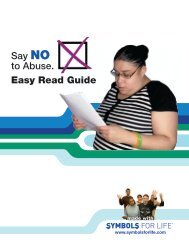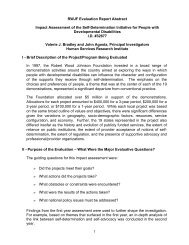A Credo for Meaningful Relationships - Human Services Research ...
A Credo for Meaningful Relationships - Human Services Research ...
A Credo for Meaningful Relationships - Human Services Research ...
Create successful ePaper yourself
Turn your PDF publications into a flip-book with our unique Google optimized e-Paper software.
A <strong>Credo</strong> <strong>for</strong> <strong>Meaningful</strong> <strong>Relationships</strong><br />
Written by citizens with disabilities across North Carolina<br />
People with disabilities are people just like YOU, but we are often disregarded in terms of our<br />
choices to live lives that are full and meaningful. Too many other people make our choices <strong>for</strong> us out<br />
of a desire to protect us, make their lives easier, keep us segregated, etc. Life without choices, love<br />
and friendship is not much of a life at all. We are lonely, sometimes on the outside looking in at your<br />
full lives. Treat us with dignity and respect and we will respond the same. Support us, care about us,<br />
even if on a professional level, the way you would want to be. As self-advocates who matter as<br />
people first, we want to have meaningful connections with other people with and without disabilities,<br />
who share our beliefs, genders and orientations, or even have different ones because being different<br />
is what makes us all the same. In terms of love, friendship and a full social way of life in the<br />
community:<br />
1. We want to learn about safe and healthy relationships – including friendships and romantic<br />
relationships with people of all abilities, genders, values, preferences and orientations that we<br />
choose.<br />
2. We want support and education about our bodies, how things work in a healthy way, how to<br />
stay healthy; how to choose intimate partners right <strong>for</strong> us, and how to protect ourselves<br />
against abuse, cancer, sexually-transmitted diseases and other health risks.<br />
3. We want to learn valuable safety tips <strong>for</strong> safer dating, connecting with new friends and<br />
maintaining contact with family – whether in person or online.<br />
4. We want the federal marriage penalty to be adjusted. The marriage penalty cuts our benefits<br />
if we choose to get married.<br />
5. We want parents and loved ones to talk openly with us when we ask about making friends,<br />
dating, sexual health and safety. If they can’t talk to us, help us find someone who can talk in<br />
terms we understand.<br />
6. We want to be recognized as adults, regardless of the challenges we face or others presume<br />
we deal with.<br />
7. We want privacy to be alone with our thoughts in our homes and rooms, and with friends and<br />
dates. Teach us how to ask staff and family to give us our space once we’ve learned safe and<br />
healthy habits.<br />
8. We want to choose our own friends instead of paid staff becoming the only friends we have.<br />
We want to choose who we don’t want to be with anymore too.<br />
9. We want to become “regulars” at places like the local coffee shop, church, the laundromat,<br />
school, the library and other places in the community, so that we can learn how to meet<br />
people. Maybe, people will begin to miss us and ask about our well-being if we don’t show up<br />
on our regular day or time.<br />
1
10. We want the community to notice us by who we are first. We aren’t solely defined by our<br />
disability labels. The staff supporting us doesn’t define us either.<br />
11. We want you to befriend us and be sensitive to us, so we have more people to share our likes<br />
and dislikes with. That way, we’ll have more people to tell if something is wrong or we need<br />
help.<br />
12. We want better, accessible transportation to see our friends and go out in the community.<br />
13. We want to go to funerals, weddings, family and community functions that are important to<br />
us, regardless of inconvenience to staff that seem to have time to take us to the doctor, the<br />
store and other service provider appointments. We are part of important family and social<br />
circles, too.<br />
14. We want to be able to make our own choices, as well as mistakes, and learn from them<br />
without being judged or having our mistakes thrown back at us every time we try to move<br />
<strong>for</strong>ward.<br />
15. We want to be heard and know our feelings and opinions matter.<br />
16. We want you to share your good or bad news with us. Don’t assume we won’t understand or<br />
it will be too upsetting. We are allowed to have our feelings and express them the best we<br />
know how. We can handle it!<br />
17. We want safe, af<strong>for</strong>dable, accessible places to live where both we and our friends can have<br />
fun without worries of danger.<br />
We are people first – adults – with wants and needs just like you. Remember that as you care <strong>for</strong>,<br />
support, advocate with, live among and work with us. We have feelings, desires, dreams and wishes<br />
<strong>for</strong> a life with love, friendship and respect. Put yourself in our place be<strong>for</strong>e you make decisions about<br />
our social and emotional experiences. Think about how you would feel if opportunities to connect<br />
with others on a deeper level were taken from you, or your need <strong>for</strong> companionship was denied. That<br />
wouldn't be all right with you, would it? It’s not all right with us. We know what we are missing. We<br />
know we deserve these experiences in our lives like others do. Support us, teach us, guide us and<br />
help us to be a bigger part of yours and other people’s lives and encourage others to be part of our<br />
lives. We have more to offer than you assume.<br />
-----------------------------------------------------------------------<br />
Copyright © 2011 Citizens with Disabilities Across North Carolina in collaboration with the N.C. <strong>Relationships</strong><br />
Initiative & Monica J. Foster of http://www.butterflywheel.com. The N.C. <strong>Relationships</strong> Initiative is funded by<br />
the N.C. Council on Developmental Disabilities and implemented by the <strong>Human</strong> <strong>Services</strong> <strong>Research</strong> Institute. All<br />
Rights Reserved, www.hsri.org/project/north-carolina-relationships-initiative/overview.<br />
You may reprint and use this <strong>Credo</strong> <strong>for</strong> <strong>Meaningful</strong> <strong>Relationships</strong> <strong>for</strong> your personal use, to share with others<br />
with disabilities, families, service providers, and as inspiration <strong>for</strong> your own work supporting people with<br />
disabilities and self-advocates having safe, healthy, social and emotional relationships of their choice.<br />
2


